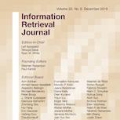MLIR is an emerging compiler infrastructure for modern hardware, but existing programs cannot take advantage of MLIR's high-performance compilation if they are described in lower-level general purpose languages. Consequently, to avoid programs needing to be rewritten manually, this has led to efforts to automatically raise lower-level to higher-level dialects in MLIR. However, current methods rely on manually-defined raising rules, which limit their applicability and make them challenging to maintain as MLIR dialects evolve. We present mlirSynth -- a novel approach which translates programs from lower-level MLIR dialects to high-level ones without manually defined rules. Instead, it uses available dialect definitions to construct a program space and searches it effectively using type constraints and equivalences. We demonstrate its effectiveness \revi{by raising C programs} to two distinct high-level MLIR dialects, which enables us to use existing high-level dialect specific compilation flows. On Polybench, we show a greater coverage than previous approaches, resulting in geomean speedups of 2.5x (Intel) and 3.4x (AMD) over state-of-the-art compilation flows for the C programming language. mlirSynth also enables retargetability to domain-specific accelerators, resulting in a geomean speedup of 21.6x on a TPU.
翻译:暂无翻译



